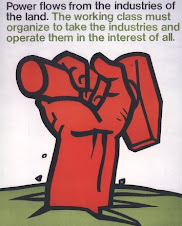You can't separate the world into [...] good and evil. But America has
successfully tied all these pockets of independence struggles, revolutions, and
extremists into one big notion of terrorism. (Wikipedia)
I think that's a fairly astute commentary on the global, indeed catholic, nature of the "War on Terrorism" (better yet: "War on Terror" - the precursor to the "War on Nightmares"?) which has been "declared" in the usual unconstitutional manner of the past half-century: by executive fiat. It seems that executive fiat is also sufficient to designate almost anyone in the world a terrorist, even if the entity in question is a democratically elected government (I thought terrorists were de rigeur stateless).
The problems here are manifold, but not perhaps the exact problems you would imagine. I doubt if the U.S. Government has called very many genuinely good, harmless people "terrorists." Nor am I afraid that will happen soon. What it does, however, is create a monolith out of a whole lot of different kinds of people, and the temptation to do so is easily explained. Just watch any film or musical set in a high school: individuals are difficult to deal with as long as they remain such, but relatively easy once they become "jocks," "cheerleaders," or "terrorists." We're fighting terrorists. They are terrorists. Okay, we're fighting them.
Alas, just as not all jocks are poor students and not all cheerleaders blonde, not all "terrorists" are cut from the same cloth. Just look at the way in which the media has recently been forced to mention something called the "Mehdi Army" led by Moqtada al-Sadr, and the existence of people called "Sadrists" and even a "Sadr City" in Baghdad. Surprise! Someone is fighting us, and it isn't al-Qaeda. They're not even Sunni Muslims, as al-Qaeda members tend to be; they come from the Shi'a majority in Iraq. This isn't "terrorism," it's internecine strife, and I wonder whose fault it is that said strife is exploding now?
Another example is the Palestinians. Again, I in no way mean to condone any of the civilian attacks performed by PLO members in any way. However, what they're trying to do is break away from a fundamentally hostile nation who continues to provoke them by expanding settlements in territory that was supposedly going to be "not Israel's" in the two-state solution. So, while we applaud the breakaway of Kosovo from Serbia, we continue to be rather unhelpful in the quest of Palestinians to actually have a state that is not riddled with checkpoints or paved over with illegal Israeli settlements, and that designation "terrorist" seems to have a lot to do with it.
I had thought of writing about this a few weeks ago, but what really spurred me on was a passage from Giorgio Agamben in his short essay "The Sovereign Police." He argues that the identification of the State with the Police is a pervasive but dangerous concept, seen perhaps most clearly in the "police actions" taken by the U.S. in places like Korea, Vietnam, and Iraq. Here's a pertinent quotation:
The investiture of the Sovereign as cop has another result: it entails a
criminalization of the adversary. Carl Schmitt has shown that in European
public law the principle according to which par in parem non habet
jurisdectionem (a peer among peers has no jurisdiction) precluded the
sovereigns of enemy states being judged as criminals [... but] we have seen with
our own eyes that [...] the enemy has come to be excluded from civil humanity
and declared a criminal from the firsdt; at that point it becomes legitimate to
annihilate the enemy through a "police operation" that is not in any way subject
to the rule of law" (Massumi, "The Politics of Everyday Fear," 63).
Police operations are not subject to the rule of law because they are seen as commensurate with it; hence American "policing" of the world against criminal "terrorism" can by all means employ such techniques as the appropriation of sovereignty from criminalized states, "special interrogation procedures" as seen in the recently declassified "torture memo," and even clumsy occupations that spark states of near-civil-war and prove lethal to a minimum of 90,000 citizens. The power of designation, it turns out, is a significant one indeed.

